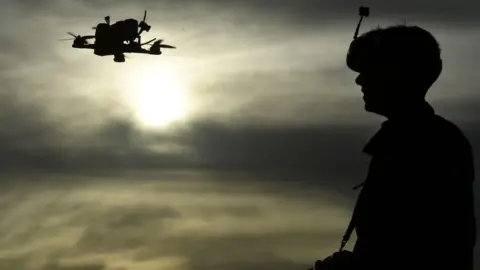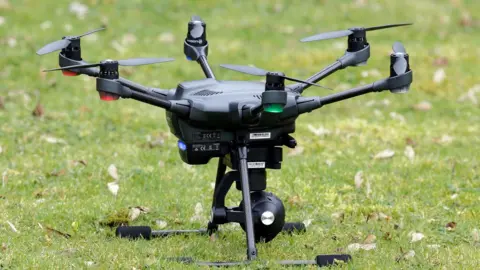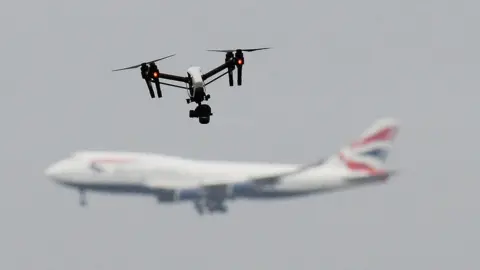Gatwick Airport: What penalty could a drone operator face?
 AFP
AFPThe person - or people - responsible for flying drones near Gatwick Airport has caused chaos for thousands of passengers.
But how serious an offence is being committed? And what punishment could be handed down?
What laws exist around drones?
Endangering the safety of an aircraft is a criminal offence which can carry a prison sentence of up to five years.
The government passed legislation earlier this year making it illegal to fly a drone within 1km of an airport or airfield boundary in the UK.
Flying above 400ft (120m) - which increases the risk of a collision with manned aircraft - was also banned as of 30 July.
Users who break the flight restrictions could face unlimited fines, up to five years in prison, or both.
But the government has been considering other proposals as part of its draft Drone Bill following a rise in the number of near-misses with aircraft.
The bill is due to be published early next year.
What else could be introduced?
 Getty Images
Getty ImagesOperators of drones weighing 250g or more will be required to register with the Civil Aviation Authority from November 2019, as well as having to take an online safety test.
Some drones, usually cheaper models, weigh less than 250g. But most - especially those with built-in cameras - weigh more.
Previously the regulations had applied to aircraft that weighed 20kg or less.
Children could also be banned from owning drones which weigh more than 250g. They would only be allowed to fly devices heavier than that if they were owned and registered by an adult.
Other proposals being considered include giving police the power to confiscate drones and issue on-the-spot fines to irresponsible pilots.
Aviation minister Baroness Sugg wrote in the Daily Telegraph that the government would be publishing its response to the consultation "soon".
She added: "We are taking things a step further. We've consulted widely and will be strengthening those existing rules even more."
Could they be charged under any other law?
 PA
PANo, according to Chris Daw QC, from Serjeants' Inn Chambers, but he says there is an argument for increasing the maximum five-year sentence for the existing offence.
He says: "It's not a huge deterrent for someone who intends to cause three days of major disruption to an international airport.
"This incident has exposed that the law doesn't have enough teeth to deal with behaviour which is incredibly disruptive and reckless."
He says even possessing a drone within a certain distance of an airfield should be considered an offence.
"The law should be made as strict as possible as the consequences could be so calamitous," he adds.
However, Richard Garside, director of the Centre for Crime and Justice Studies, says threatening longer sentences isn't the answer.
He says the industry should follow the example of car manufacturers - which have reduced car crime dramatically since the 1990s by improving security features - and find a technological solution.
